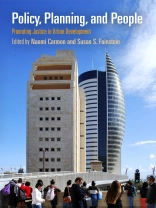The contributors of Policy, Planning, and People argue for the promotion of social equity and quality of life by designing and evaluating urban policies and plans. Edited by Naomi Carmon and Susan S. Fainstein, the volume features original essays by leading authorities in the field of urban planning and policy, mainly from the United States, but also from Canada, Hungary, Italy, and Israel. The contributors discuss goal setting and ethics in planning, illuminate paradigm shifts, make policy recommendations, and arrive at best practices for future planning.
Policy, Planning, and People includes theoretical as well as practice-based essays on a wide range of planning issues: housing and neighborhood, transportation, surveillance and safety, the network society, regional development and community development. Several essays are devoted to disadvantaged and excluded groups such as senior citizens, the poor, and migrant workers. The unifying themes of this volume are the values of equity, diversity, and democratic participation. The contributors discuss and draw conclusions related to the planning process and its outcomes. They demonstrate the need to look beyond efficiency to determine who benefits from urban policies and plans.
Contributors: Alberta Andreotti, Tridib Banerjee, Rachel G. Bratt, Naomi Carmon, Karen Chapple, Norman Fainstein, Susan Fainstein, Eran Feitelson, Amnon Frenkel, George Galster, Penny Gurstein, Deborah Howe, Norman Krumholz, Jonathan Levine, Anastasia Loukaitou-Sideris, Enzo Mingione, Kenneth Reardon, Izhak Schnell, Daniel Shefer, Michael Teitz, Iván Tosics, Lawrence Vale, Martin Wachs.
Tabela de Conteúdo
Preface
I. PLANNING IN AN ERA OF TURBULENCE
Chapter 1. The Profession of Urban Planning and Its Societal Mandate
—Naomi Carmon
Chapter 2. Restoring Just Outcomes to Planning Concerns
—Norman Fainstein and Susan S. Fainstein
Chapter 3. Environmental Equity: Is It a Viable City Planning Goal?
—Eran Feitelson
Chapter 4. From Socialism to Capitalism: The Social Outcomes of the Restructuring of Cities
—Iván Tosics
Chapter 5. The Past, Present, and Future of Professional Ethics in Planning
—Martin Wachs
II. EQUITY ORIENTED PLANNING
Chapter 6. Toward an Equity-Oriented Planning Practice in the United States
—Norman Krumholz
Chapter 7. Urban Transportation and Social Equity: Transportation-Planning Paradigms That Impede Policy Reform
—Jonathan Levine
Chapter 8. Social Equity in the Network Society: Implications for Communities
—Penny Gurstein
Chapter 9. The Center-Periphery Dilemma: Spatial Equality and Regional Development
—Daniel Shefer and Amnon Frenkel
III. PLANNING AND EXCLUDED GROUPS
Chapter 10. Planning and Poverty: An Uneasy Relationship
—Michael B. Teitz and Karen Chapple
Chapter 11. The City as a Local Welfare System
—Alberta Andreotti and Enza Mingione
Chapter 12. Policies Toward Migrant Workers
—Itzhak Schnell
Chapter 13. Planning for Aging Involves Planning for Life
—Deborah Howe
IV. HOUSING AND COMMUNITY
Chapter 14. Public Housing in the United Sites: Neighborhood Renewal and the Poor
—Lawrence J. Vale
Chapter 15. Neighborhood Social Mix: Theory, Evidence, and Implications for Policy and Planning
—George C. Galster
Chapter 16. Suspicion, Surveillance, and Safety: A New Imperative for Public
Space?
—Tridib Banerjee and Anastasia Loukaitou-Sideris
Chapter 17. Beyond the Ladder: New Ideas about Resident Roles in Contemporary Community Development in the United States
—Rachel Bratt and Kenneth M. Reardon
List of Contributors
Index
Acknowledgments
Sobre o autor
Naomi Carmon is Professor of Urban Planning and Sociology at Technion-Israel Institute of Technology. Susan S. Fainstein is a Senior Research Fellow at the Harvard Graduate School of Design and the author of The Just City.












